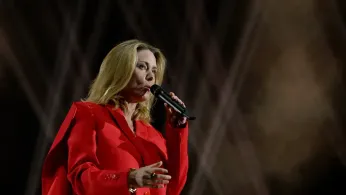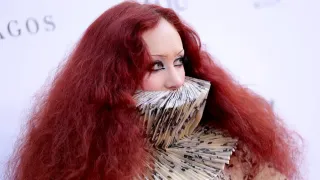
4 hours ago
Why Artists Are Condemning Róisín Murphy’s Comments on Transgender People
READ TIME: 4 MIN.
Róisín Murphy, a prominent Irish singer and former member of the electronic duo Moloko, has found herself at the center of controversy following a series of social media posts regarding transgender and non-binary identities. On October 21, 2025, Murphy shared a graph on X (formerly Twitter) suggesting a sharp decline in the number of 18- to 22-year-olds identifying as transgender or non-binary between 2022 and 2024. Captioning the post, Murphy wrote, “It was never real. Terribly sad though. Absolute havoc wreaked on children, families and society” .
The graph cited by Murphy originated from a report produced by the Centre for Heterodox Social Science, which has faced criticism for its methodology and ideological framing. The report claims a “decline” in trans and queer identity among young Americans, but many have challenged its credibility and pointed to a rise in anti-trans rhetoric and policy as a more likely explanation for shifts in self-identification .
Murphy’s post was not an isolated incident. In August 2023, she faced criticism after posting on Facebook about puberty blockers, describing them as “f**ked,” and suggesting that “big Pharma” was exploiting “mixed-up little kids.” She pleaded not to be called a “TERF” (trans-exclusionary radical feminist) but reiterated that “vulnerable” children needed protection – language widely recognized as echoing anti-trans talking points .
Murphy’s remarks have drawn condemnation from a diverse range of artists, particularly within the LGBTQ+ community. Bisexual Irish singer CMAT (Ciara Mary-Alice Thompson) responded on Instagram, calling Murphy’s actions publicly “bullying” and explicitly stating that Murphy “is absolutely not a voice to be listened to or trusted when it comes to trans lives.” CMAT urged her followers not to circulate Murphy’s posts, highlighting the trauma that spreading such rhetoric can cause and encouraging donations to trans advocacy groups such as the Trans Equality Network Ireland (TENI) .
Other artists, including American DJ The Blessed Madonna (Marea Renee Stamper), have also spoken out. In a video on Instagram, The Blessed Madonna criticized Murphy for lacking the understanding to interpret the data she shared and for failing to recognize the consequences of anti-trans rhetoric, directly tagging Murphy’s account to ensure visibility. Musicians Sega Bodega, Crystal, and Sister Sister have likewise publicly rebuked Murphy’s comments, emphasizing the harm caused to transgender individuals by denial of their identities .
Fans and LGBTQ+ advocates have voiced their disappointment, with many noting Murphy’s previous embrace of queer culture in her music and performances. Some pointed out the contradiction between her past work, such as the song “Gone Fishing” inspired by the iconic trans documentary “Paris is Burning,” and her current statements that undermine transgender existence .
Murphy’s comments have reignited ongoing conversations about transphobia within the music industry and the broader cultural sphere. LGBTQ+ organizations and mental health professionals have repeatedly documented that anti-trans rhetoric contributes to increased rates of depression, anxiety, and suicide risk among transgender youth. A 2024 report from the American Psychological Association summarizes research showing that negative media coverage and social hostility toward transgender people have tangible, harmful effects on well-being and public health .
Transgender advocates argue that the apparent decline in self-identification among young people may be less a reflection of “fad” or “delusion,” as some critics claim, and more an outcome of rising anti-trans legislation, hostile school environments, and social stigma. Rather than supporting or protecting vulnerable youth, rhetoric denying the reality of transgender identities may in fact drive people further into isolation and silence .
Many LGBTQ+ artists and fans see Murphy’s statements as a betrayal, particularly given her previous engagement with queer communities and themes. They stress that artists with large platforms have a responsibility to foster inclusion, not division, and to listen to the lived experiences of transgender people rather than spreading misinformation or dismissing their realities .
In subsequent responses to criticism, Murphy has asserted her right to personal opinions, stating, “I have zero hate for trans people, I do not deny anyone’s existence,” while simultaneously referring to the belief that one can change sex as “insane” and claiming that families, women, and gay people have been “adversely affected” by transgender rights .
Murphy has framed the backlash as a threat to artistic freedom, alleging that critics are part of a “mob” and that the arts are no longer “free and inclusive.” However, many in the LGBTQ+ community argue that inclusivity means supporting the most marginalized, not excluding or denying their reality. They note that transgender and non-binary people have only recently begun to experience greater visibility and safety in creative spaces – progress that is now threatened by high-profile figures echoing anti-trans rhetoric .
The controversy surrounding Róisín Murphy illustrates the persistent challenges facing transgender communities, even within spaces historically aligned with LGBTQ+ rights. As artists and activists continue to push back, the episode serves as a reminder of the ongoing work required to ensure that all members of the queer community are respected and protected, both on and off the stage.






